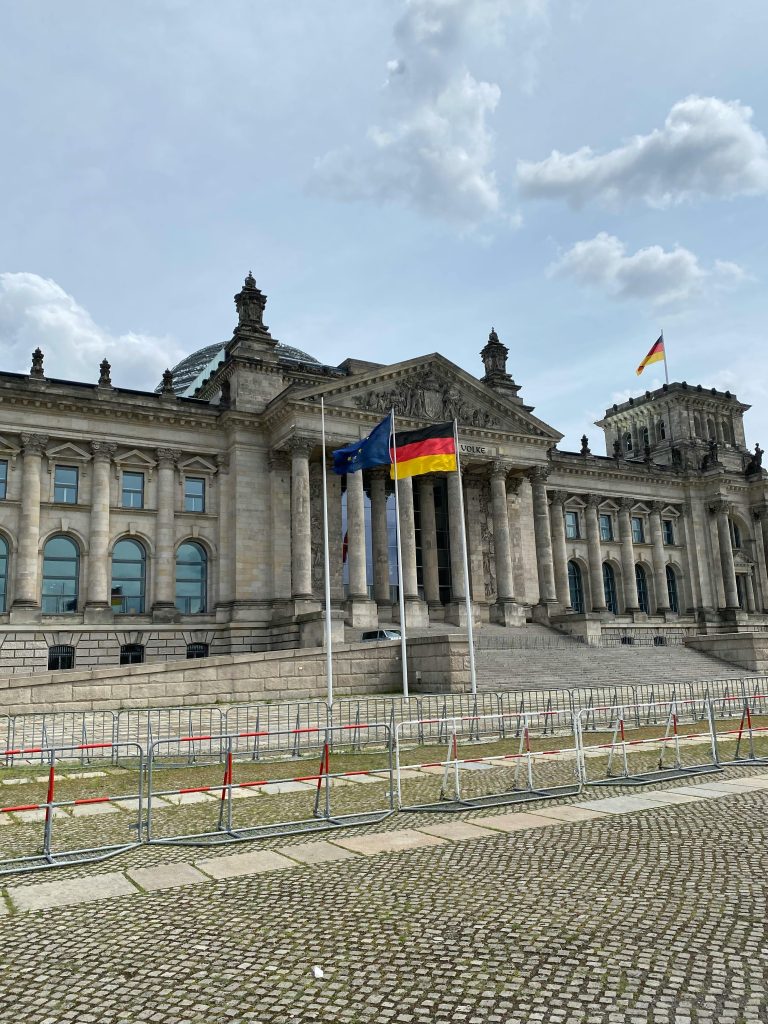Your Chance for a Paid PhD: Dive into Innovation with the Helmholtz-Zentrum Hereon Scholarship 2025!

Are you a bright, ambitious graduate eager to make a real impact through cutting-edge research? Do you dream of pursuing a PhD in a vibrant, international scientific community, all while receiving financial support? Then look no further! The Helmholtz-Zentrum Hereon Scholarship Program 2025 could be your golden ticket to a fully funded doctoral journey.
Imagine contributing to innovative solutions for pressing global challenges in areas like materials science, environmental research, and engineering. At Helmholtz-Zentrum Hereon, located in Geesthacht near Hamburg, Germany, this vision can become your reality. This renowned research center offers exceptional opportunities for doctoral candidates to work alongside leading scientists, utilize state-of-the-art facilities, and become part of a dynamic research environment.
What Makes the Helmholtz-Zentrum Hereon Scholarship So Attractive?
- Full Funding: This scholarship provides comprehensive financial support, allowing you to fully concentrate on your research without the burden of financial worries. This typically includes a monthly stipend to cover your living expenses.
- World-Class Research Environment: Hereon boasts an impressive infrastructure and a collaborative atmosphere. You’ll have access to advanced laboratories, unique experimental facilities, and the expertise of internationally recognized researchers.
- Diverse Research Topics: Whether your passion lies in developing sustainable materials, understanding coastal and marine systems, advancing lightweight construction, or exploring innovative energy technologies, Hereon offers a wide array of exciting research areas for your PhD.
- Interdisciplinary Collaboration: You’ll have the chance to work on interdisciplinary projects, fostering a holistic understanding of complex scientific questions and broadening your network.
- Excellent Supervision and Mentoring: Hereon places a strong emphasis on providing doctoral candidates with dedicated supervision and mentoring, guiding you through your research and supporting your professional development.
- International Community: You’ll be part of a diverse and international community of researchers, offering opportunities for cultural exchange and the development of a global network.
- Location, Location, Location: Situated near the vibrant city of Hamburg and close to the beautiful Baltic Sea coast, Geesthacht offers a high quality of life with a blend of urban amenities and natural beauty.
Who Should Apply?
The Helmholtz-Zentrum Hereon Scholarship Program 2025 is open to highly qualified and motivated graduates holding a Master’s degree (or equivalent) in relevant fields such as:
- Materials Science
- Physics
- Chemistry
- Engineering (e.g., Mechanical, Chemical, Environmental)
- Environmental Sciences
- Biology
- And related disciplines
Successful candidates will demonstrate a strong academic record, a genuine interest in research, excellent analytical and problem-solving skills, and the ability to work independently and as part of a team.
How to Seize This Opportunity:
The application process typically involves submitting a comprehensive application package, which may include:
- A detailed curriculum vitae (CV)
- Academic transcripts and degree certificates
- A research proposal outlining your intended PhD project (often linked to specific open positions at Hereon)
- Letters of recommendation from academic referees
- A statement of motivation explaining your interest in the scholarship and Hereon’s research

What You’ll Receive?
At Helmholtz-Zentrum Hereon, expect not just research — expect a career-launching experience:
- 36-month funded PhD with salary up to pay group 13 (TV EntgO Bund)
- Full access to world-class labs and infrastructure
- International research networking across 60+ nations
- PhD Buddy Program for support and mentorship
- Childcare facilities and flexible work policies
- 6 weeks of holiday + company holidays
- Free employee support services & canteen benefits
- Research in scenic Geesthacht, just outside Hamburg.
The last date to apply for the PhD position at Helmholtz-Zentrum Hereon is May 11, 2025.
Don’t Miss Out!
The Helmholtz-Zentrum Hereon Scholarship 2025 represents an exceptional opportunity to launch your research career at a leading international institution. It’s a chance to contribute to groundbreaking discoveries, work with top scientists, and build a strong foundation for your future.
Keep an eye on the official Helmholtz-Zentrum Hereon website ([search query 1: “Helmholtz-Zentrum Hereon PhD scholarships”] [search query 2: “Helmholtz-Zentrum Hereon doctoral positions”] [search query 3: “Helmholtz-Zentrum Geesthacht research areas”]) for detailed information on the application process, specific research topics available for PhD projects, eligibility criteria, and important deadlines.
Your journey towards a paid PhD and a fulfilling research career could begin right here at Helmholtz-Zentrum Hereon. Take the leap and explore this fantastic opportunity!

Thinking of Saying “Hallo” to Germany? Essential Things to Consider Before Relocating
Germany, a land of rich history, stunning landscapes, and a thriving economy, has become an increasingly attractive destination for people from all over the world. The prospect of high-quality education, robust social security, and a vibrant cultural scene is undoubtedly appealing. However, uprooting your life and moving to a new country is a significant decision that requires careful consideration and thorough preparation.
Before you pack your bags and start dreaming of Oktoberfest and fairytale castles, let’s delve into some crucial aspects you need to ponder before making the big move to Germany.
1. The Visa and Legal Requirements: Your Entry Ticket
This is arguably the most critical aspect. Germany has specific regulations regarding who can enter and reside within its borders. Your citizenship will determine the type of visa you need and the process involved.
- EU/EEA Citizens: Citizens of other EU/EEA countries and Switzerland generally have the right to live and work in Germany without a visa. However, registration with the local authorities (“Anmeldung”) is still mandatory.
- Non-EU/EEA Citizens: The process is more complex. You’ll likely need a specific visa depending on your purpose of stay, such as a work visa, student visa, family reunification visa, or a visa for highly qualified professionals. Research the specific requirements for your situation well in advance through the German embassy or consulate in your current country ([search query 1: “German visa requirements for [your nationality]”]). Be prepared for paperwork, potential interviews, and processing times that can vary.
2. Language: More Than Just “Guten Tag”
While many Germans, especially in larger cities and professional environments, speak English, relying solely on it can significantly impact your daily life and integration.
- Everyday Interactions: Simple tasks like grocery shopping, dealing with bureaucracy, and interacting with neighbors will be much easier if you have a basic understanding of German.
- Job Market: While some international companies operate primarily in English, many German employers prefer or even require a certain level of German proficiency.
- Social Integration: Learning the language is key to truly immersing yourself in German culture, making local friends, and feeling at home. Consider starting language lessons well before your move.
3. Finances: Counting Your Euros
Germany is generally considered a relatively affordable Western European country, but the cost of living can vary significantly depending on the city or region.
- Accommodation: Rent, especially in major cities like Munich, Berlin, and Frankfurt, can be quite high. Factor in additional costs like utilities (heating, electricity, water), internet, and potentially a deposit. Research average rental prices in your intended location ([search query 2: “cost of living in [German city]”]).
- Living Expenses: Budget for groceries, transportation (public transport is excellent in most cities), health insurance (mandatory in Germany), leisure activities, and other daily needs.
- Proof of Funds: Depending on your visa type, you might need to prove that you have sufficient financial resources to support yourself during your initial stay.
4. Accommodation: Finding Your “Zuhause”
Finding suitable accommodation can be challenging, especially in popular urban areas.
- Early Search: Start your search well in advance of your intended move. Online platforms are a good starting point.
- Temporary Accommodation: Consider booking temporary accommodation (e.g., a serviced apartment or Airbnb) for your initial arrival, giving you time to search for a long-term place.
- Types of Housing: Familiarize yourself with different types of accommodation, such as apartments (“Wohnung”), shared flats (“Wohngemeinschaft” or WG), and houses (“Haus”).
- The Application Process: Be prepared for a competitive rental market. Landlords often require documents like proof of income, credit checks (“SCHUFA-Auskunft”), and a letter of introduction.
5. Bureaucracy: Prepare for Paperwork

Germany is known for its structured and often bureaucratic processes. Be prepared for paperwork and official procedures.
- Registration (“Anmeldung”): As mentioned earlier, registering your address with the local authorities is one of the first things you’ll need to do.
- Health Insurance: Obtaining German health insurance is mandatory for residents. Research the different types (public and private) and choose one that suits your needs.
- Bank Account: Opening a German bank account will be essential for receiving salary, paying bills, and managing your finances.
- Taxes: Understand the German tax system and your obligations as a resident.
6. Culture and Social Integration: Embracing the German Way
While Germany is a welcoming country, understanding some cultural nuances can help you integrate more smoothly.
- Punctuality and Efficiency: Germans generally value punctuality and efficiency. Being on time for appointments and respecting schedules is important.
- Direct Communication: Germans tend to be direct in their communication. While it might seem blunt to some, it’s usually intended to be clear and honest.
- Privacy: Personal space and privacy are highly valued.
- Recycling: Germany has a very efficient recycling system. Familiarize yourself with the rules in your area.
- Social Activities: Explore local clubs and associations (“Vereine”) based on your interests to meet new people and build a social network.
7. Climate and Location: Choosing Your Ideal Setting
Germany has a temperate climate with four distinct seasons. Winters can be cold and sometimes snowy, while summers are generally mild. Consider the regional differences when choosing your location.
- North Germany: Often flatter with a maritime influence.
- South Germany: Hilly or mountainous, with warmer summers and colder winters.
- East and West Germany: Each has its own distinct history and cultural nuances.
Think about what kind of environment suits your lifestyle and preferences.
Moving to Germany is an exciting adventure, but thorough preparation is key to a successful transition. By considering these essential aspects, you’ll be better equipped to navigate the process and embrace your new life in this fascinating country. Good luck with your move!